Lowell Week in Review: March 18, 2018

Happy St. Patrick’s Day
St. Patrick’s Day is always a big deal in Lowell. I celebrated by joining Dave McKean and Walter Hickey on yesterday morning’s Acre Neighborhood Walking Tour which was part of Irish Cultural Week and also the kickoff of the 2018 Lowell walking tour season.
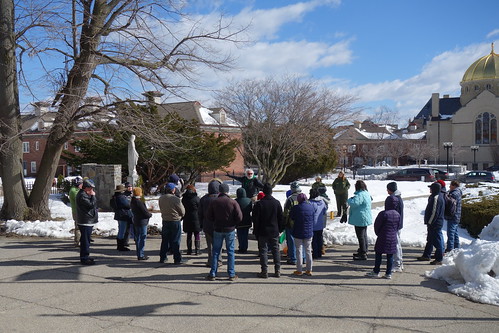
Despite the chilly and blustery weather, 35 people joined the tour which began at Lowell National Park Visitor Center and proceeded up Merrimack Street to the bridge over the Western Canal, then down Lewis St to Ecumenical Plaza. Along the way we heard stories about the early Irish in Lowell. The tour ended inside a majestic but cozy St. Patrick’s Church.
Afterwards, Dave sold copies of his new book, “The Days That Went Before Us: Stories & Accounts of Lowell’s Early Irish.” Originally, the book was to make its debut at this year’s Acre Forum which had been scheduled for Thursday, March 8, 2018, but was postponed because of a snowstorm and resulting power outages. The new date for the Acre Forum has not yet been determined.
After the tour, I roamed around downtown. Even though it was before noon, the streets were alive with people wearing green and the bars looked welcoming and well-stocked.
Thursday night was the Lowell St. Patrick’s Day Dinner at the UMass Lowell Inn & Conference Center. City Manager Kevin Murphy and State Senator Eileen Donoghue were the co-hosts. Because Murphy is retiring in two weeks and Donoghue has applied to be his replacement, the potential for awkward moments was great, but both subtly confronted that issue early with grace and good humor.
My vote for funniest moment of the night came when Murphy told the overflow crowd that he had figured out a way to raise sufficient funds to build a new swimming pool for Lowell High: The manager had gotten John Chemaly of Trinity EMS to contribute $100 to the swimming pool fund each time Mayor Bill Samaras said “I used to be the headmaster of Lowell High.”
Following Murphy to the podium was Mayor Samaras who, a few minutes into his own comedy routine spontaneously said, “I used to be the headmaster of Lowell High.” The crowd gasped and Chemaly, dramatically arose from his seat and trudged up to the podium, counting out five $20 bills from a roll of cash he withdrew from his pocket and slamming the money on the podium.
Over the rest of the evening there were a few good jokes and many that were not so good. Governor Baker spoke mostly about how invisible he felt last week when he and Tom Brady had their heads shaved to raise money for cancer research. The professional comedian was OK for a professional comedian, and the food, a corned beef and cabbage dinner, was good for the UMass Lowell Inn & Conference Center. Unfortunately, the buffet trays were emptied before everyone had eaten so a few dozen at the end of the line headed back to their tables with plates full of boiled cabbage which was all that was left by then.
New Businesses in Downtown
While roaming around downtown yesterday, I checked out a few of the storefronts that house or will soon house new businesses according to info in this week’s City Council packet. Here are photos of some of the storefronts:
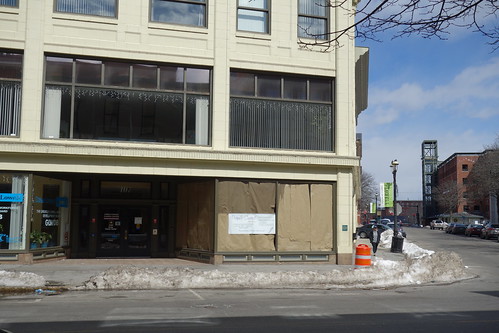
Purple Carrot Bakery – 107 Merrimack Street (formerly Hypertext Bookstore Café)
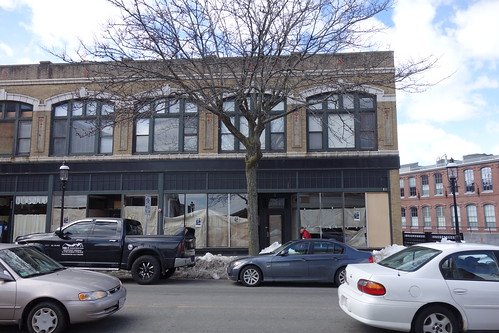
Sahel (African Restaurant) – 135 Central Street
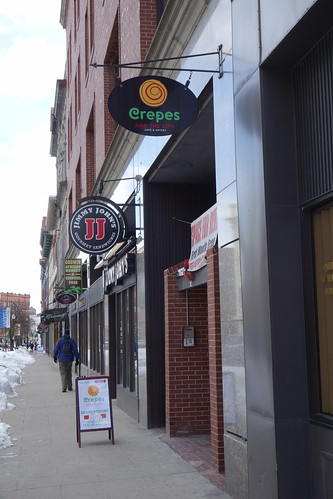
Crepes and the City – 144 Merrimack Street
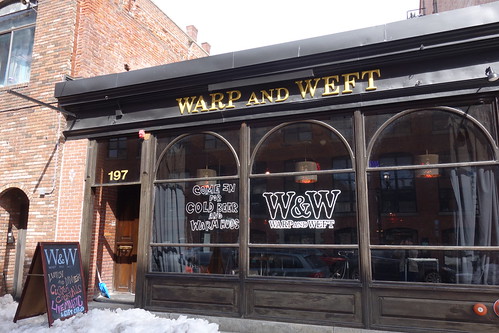
Warp & Weft – 197 Market Street
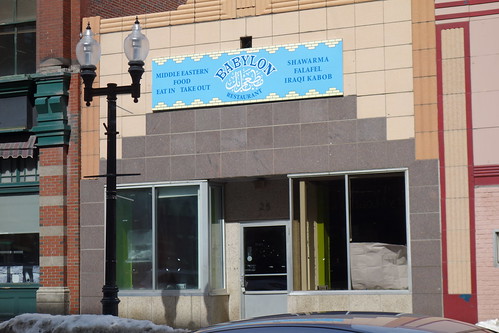
Walgreen’s (retail pharmacy) – 25 Merrimack Street (formerly Babylon Restaurant)
The Keep – 110 Gorham Street (no photo yet).

Hamilton Canal District Infrastructure Work
Although it’s been delayed a bit by the several snowstorms we’ve endured this month, the pace of construction work on the Dutton Street side of the Hamilton Canal District has really picked up. City Manager Murphy has long said that no one will construct a building in that part of the district until all the infrastructure improvements (like a road and underground utility lines) have been installed. That’s what this recent burst of work is all about. Also, as the Judicial Center gets closer to completion – it’s still supposed to open next summer – the need to find parking for the 1200 employees, jurors and litigants who are expected to come to that building each day becomes more urgent. The faster the city’s new Hamilton Canal District Parking Garage goes up, the better.
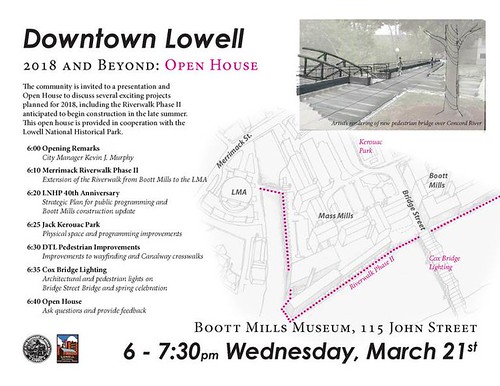
Urban Planning
New businesses, new buildings, new roads – new anything – just don’t happen spontaneously. The successful ones, at least, are the result of intense planning and preparation. For those interested in urban planning in Lowell, there are a couple of sessions coming up that may be worth attending.
On Wednesday, March 21, 2018 from 6 to 7:30 pm there will be a presentation and open house at the Boott Mills Museum, 115 John Street. Called “Downtown Lowell: 2018 and Beyond,” the session will feature opening remarks by City Manager Kevin Murphy, a presentation on the coming extension of the Riverwalk from Boott Mills to the Lowell Memorial Auditorium; an update on plans for Lowell National Historic Park’s 40th birthday celebration (which is this year); coming improvements to Jack Kerouac Park and overall pedestrian improvements; and plans for the lighting of the Cox Bridge on Bridge Street. These presentations will be followed by an Open House during which audience members will be able to ask questions and offer feedback.
On Tuesday, April 24, 2018, from 8 to 10:30 a.m. at the UMass Club in Boston, MassInc is hosting a forum called “Exploring the Future of Transit-Oriented Development in Gateway Cities.” The event costs $25 and requires advance registration. Among other things, the event will feature a conversation with Stephanie Pollack, Secretary of MassDOT, and Jay Ash, Secretary of Housing and Economic Development, moderated by Dante Ramos of the Boston Globe. Since Lowell is a Gateway City and because transportation is central to our continued economic development, hopefully a number of people from the city will attend and report back on the discussion.
I plan to attend the March 21 session at the Boott Mills. I’ve been to a number of citizen planning forums going back a number of years, from the Hamilton Canal District to the city’s Master Plan to the more recent Lord Overpass public meetings. I enjoy going to these meetings because everyone who attends is positive and enthused about the planning process.
We learned from the Jane Jacobs movie a couple of weeks ago that urban planning in the 1950s and 1960s was a top-down process in which “experts” told the people who would be affected what was best for them. The reaction to this, incited in part by Jacobs, transformed the urban planning process into one that valued input from affected populations.
In this more recent tradition, the Lowell Planning Department does a great job of gathering citizen input in the development of plans. The public sessions I have attended through the years have had a substantial impact on the final planning documents.
However, there is also a tradition among city councils in Lowell to not pay particularly close attention to planning documents or their contents. Enacting these kinds of big urban plans is usually a precondition of receiving money from a state grant and since no one in local government wants to pass up state money, plans typically get endorsed by councilors without too much scrutiny of their contents.
The problem with this approach is that when it comes time to implement the plans contained in these documents, a lot of people wake up and realize they don’t agree with the plans and start complaining to councilors. The councilors, who were never heavily invested in the plans anyway, are quick to question the plans or even dispense with them entirely. That in turn frustrates the citizens who participated in the planning forums back at the beginning of the process, leaving them feeling as if their input was of no consequence to councilors and making them less likely to participate again in the future and to grow more cynical about the workings of city government.
As an example of this dynamic, consider the Hamilton Canal District. Every planning document developed over the course of nearly a decade called for the HCD to be a mixed use development – meaning commercial, retail and residential uses all mixed together. Yet this past term’s council voted, seemingly out of the blue, to entirely exclude housing from the Hamilton Canal District. So a decade of planning based on public input was tossed out the window of the council chamber for no apparent reason other than some councilors were worried that any housing constructed in the HCD might be occupied by poor people. Fortunately, months later, the same council reversed that decision (without any explanation of why) and we’re back to where we started with the Hamilton Canal District, yet faith in the planning process by those who pay attention to those things took a big hit.
I think this planning disconnect played a big role in the proposed private dormitory for upper Merrimack Street that the planning board defeated two weeks ago. Several years ago the council made a number of changes to the zoning code which, when reasonably read, pretty much invited this type of development on that kind of parcel. Yet when such a development was proposed, it not only was defeated by the planning board, but was also publicly opposed by some of the same city councilors who once endorsed the zoning provisions upon which it was based.
I wasn’t thrilled with the dormitory project because of the way it walled itself off from the public around most of its perimeter, but given the contents of our zoning code, I can’t blame the developer for proposing it. I’m not sure whether he will bother to appeal – the deadline for doing so is sometime this week – but relitigating the matter in court would be an interesting process.
While we all could use a better understanding of what is in the zoning code, that’s not the real problem. The main issue, I think, is a lack of a shared vision of where the city should be headed as it moves into the future. That doesn’t mean bumper sticker phrases like economic development or public safety, it means tangible plans that clearly state their objectives. It means acceptance of those plans by city leaders and by a critical mass of city residents. And it means the self-discipline to stick with the plans in the face of criticism from those who come late to the process. Plans can change when warranted by the circumstances, but it is better to change an existing plan than it is to make things up as you go along.

Behemoth
Behemoth: A History of the Factory and the Making of the Modern World by Joshua Freeman is a great new book that covers the development and evolution of the factory from the earliest textile mills in England in the late 1700s to monumental factories operating in China today. Along the way, Freeman spends several chapters in Lowell, Massachusetts, crediting the city’s founders with several important innovations in the development of the factory, among them are the first time a joint stock corporation was used to finance a manufacturing enterprise and also how the regional farm girls were recruited and retained as an industrial work force.
A review of the book by Beth Macy made the front page of last Sunday’s New York Times Book Review. Macy called the book “required reading for all Americans” and says it “lays out two centuries of factory production all over the world in ways that are accessible, cogent, occasionally riveting and thoroughly new.”
The one criticism Macy had of the book was its failure to account for the negative effects of de-industrialization in the United States. In a regrettable way, she circles back to Lowell to illustrate that point, writing:
Behemoth is contextually thin in places, especially Freeman’s take on deindustrialization. He doesn’t mention that, as life expectancy in East Asia climbed, mortality rates rose in America, or that drug dealers, not farm girls seeking sewing jobs, now flock to Lowell — a distribution hub for heroin.
A distribution hub for heroin? Do we have any volunteers willing to write the letter to the editor rebutting that claim?
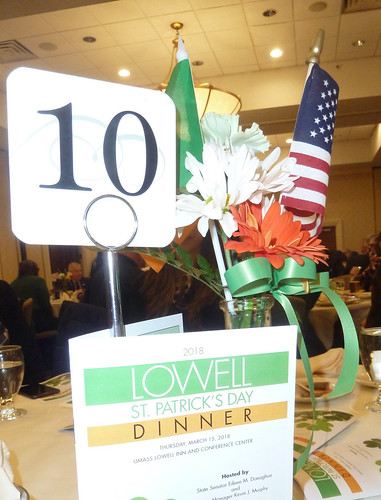
I have a work conflict and can’t attend the Downtown Lowell presentation and would certainly appreciate a recap of the discussion (or being sent in the right direction if the City is planning to post a recap of the event online.)
Regarding the heroin distribution hub mentioned in the NYT, everything that I’ve read about the opioid crisis and how and why so much heroin is flowing into the northeast mentions that Lowell (and Lawrence) are two of the major distribution hubs. Even though that doesn’t jibe with my everyday experiences in Lowell, I have no reason to believe that it isn’t true. It’s unfortunate that our city is a place of note in the opioid crisis but it’s mostly unfortunate that it’s the only thing that’s being mentioned about Lowell on a national level.
Planning and public input is great but until we get our regulations in line with our goals they’ll be massive opposition to new developments. The regulation that ruins the best laid plans is minimum parking requirements.
The “bottom-up” opposition to the dorm plan was about losing on-street parking, the size of the building, and the “walling off” of Market Street. The parking requirements caused the latter two outcomes. Don’t blame the applicant blame the parking requirement.
To assuage fears of losing on-street parking I recommended creating a parking preservation permit system. Little to no parking permits would be set aside for new developments. With the parking concern nullified the city could eliminate parking requirements in targeted areas prime for development. This wouldn’t prohibit applicants from building some parking into plans but it would drastically reduce off-street parking thus reducing the size of the building. It would’ve also allowed the applicant to build ground floor retail into the plans on Market St.
Had the city set the regulations right prior to Jeanne D’arc trying to sell the land most of the opposition would’ve came from UML. I don’t think that would’ve been enough and the applicant would’ve been granted approval to move forward.
If the city updates the parking regulations to allow for the type of development people plan and hope for Jeanne D’arc could actually break the parcel up to allow for smaller local developers to compete in developing it. This would keep more money circulating in the Lowell economy instead of Boston. We share a common thread right?